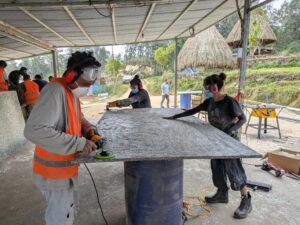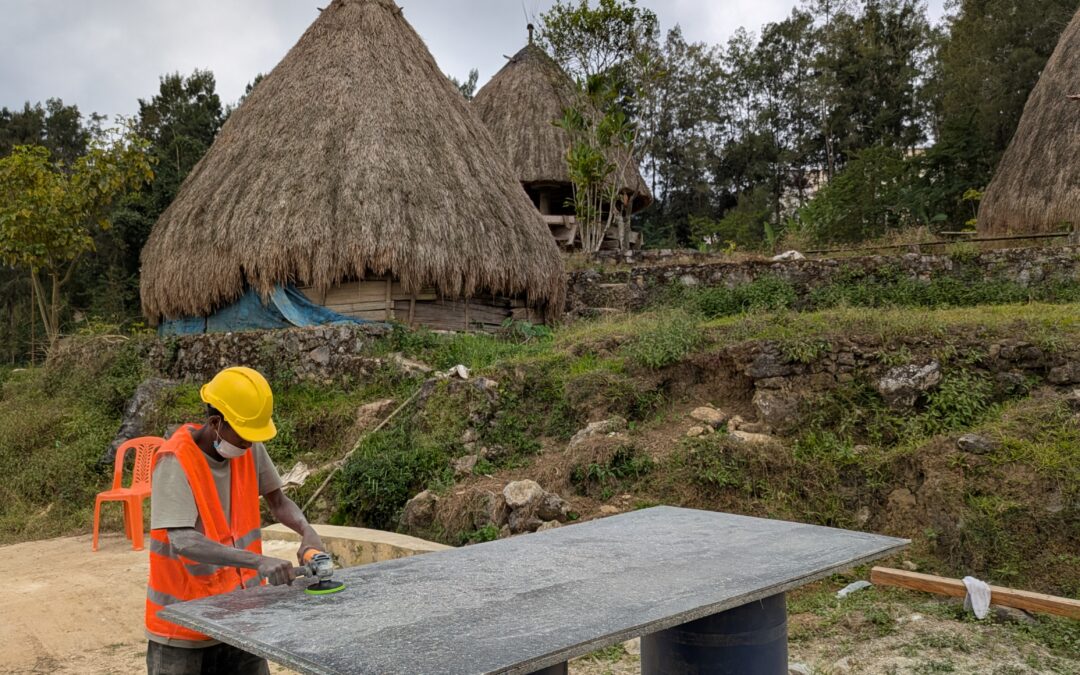Coffee is, in many ways, the lifeblood of Timor-Leste. It is the nation’s second-highest earning export – only oil earns more – and nearly 40% of households rely on it for some or all of their income. But the coffee industry in Timor-Leste is underdeveloped, bean quality is unreliable and profitability is low, leaving most Timorese farmers living under the poverty line.
With the country’s oil reserves dwindling and expected to run dry, coffee is well-positioned to step up. A favourable natural environment means there is potential for high-quality, distinctively Timorese coffee, and lucrative, overseas speciality markets that could help improve the lives and livelihoods of local communities are within reach. To get there, productivity will need to increase, and coffee quality must be enhanced.
But how? Enter Engineers Without Borders Australia (EWB), Raw Material and Mara Mresa, who are constructing solar-powered coffee processing hubs in two remote, off-grid communities – Koileki and Raimutin – located in the country’s mountainous centre, about five hours south of the capital, Dili. Raw Material is a social enterprise aimed at maximising profits for smallholder coffee farmers and Mara Mresa is a local organisation that connects farmers to exporters and has built close relationships within both communities.
The program will see both Koileki and Raimutin’s basic, diesel-powered coffee processing equipment replaced with solar-powered, custom wet mills and drying solutions, as well as electric pulpers for the first time. The newly installed solar panels will also come
complete with battery storage that helps ensure energy remains reliable and can be used into the night, even outside of coffee season. Once complete, the program will empower the people of Koileki and Rai Mutin to cleanly and efficiently produce higher-grade coffee that can be exported to a specialty coffee market at higher prices, drastically cutting the rate of poverty among farmers. All of this has been made possible by funding from the Business Partnerships Platform and the Australian Government, and guided by Raw Material.
In addition to enabling better quality coffee, the solar panels will generate surplus energy that can be used by the communities for some household use, including device charging, refrigeration and lighting, further establishing these new additions as true community hubs.
In line with EWB’s commitment to human-centered design, the program kicked off with extensive consultation, made possible by Raw Material and Mara Mresa.
“We went in with key questions, focus groups and particular people that we wanted to hear from,” explained Rebecca Brown, an EWB Australian Volunteers Program volunteer involved in the project. “And we got some interesting ideas from people on how they might use the system outside of the coffee processing times. There was a lot of talk around cultural activities, like tais [a form of woven cloth traditional to Timor-Leste] weaving.” Access to refrigeration, the use of small appliances like rice cookers and remote education opportunities were also raised, especially among women, who, in line with EWB’s gender-equitable approach, were a particular focus of the consultation.
The program then moved on to the design phase, where it received generous pro bono assistance from Aurecon, a global leader in engineering design. Aurecon smoothly shepherded the solar PV system design from defining the system requirements through to the conceptual design stage. Aurecon has also provided ongoing technical guidance for quality assurance and maintenance requirements.
The wet mill design, based on custom equipment used on another project by Raw Material in Colombia, was chosen because of its proven effectiveness and productivity in similar conditions to Timor-Leste and due to its good scalability potential.
The initial intention was for some relatively minor upgrades to the Colombian design before implementation in Koileki and Raimutin, but over time it was clear that more could be done. Jack Nugent, EWB International Program Manager, explained, “The plan has swung from using stainless steel to using a recycled, plastic board material for as much of the infrastructure as possible.” The change in material helped reduce costs, increased the potential to scale and made local fabrication more manageable. “You can work with it in a similar way to carpentry … using hand saws, circular saws, screws and bolts. Because it’s a plastic material, you can heat it, you can form it. There’s innovative ways of bending it and shaping it,” explained Jack.
The program has, as many do, run into its share of unavoidable challenges. An extended wet season in Timor-Leste saw installation of the solar panels delayed, as both Koileki and Raimutin were inaccessible. However, equipment fabrication was completed in Dili, meaning that once moved onto the sites in June 2025, installation and commissioning of the solar panels was completed in only a few days.

Next up is construction of the wet mill infrastructure, taking place in August, as well as operational training to local managers and staff. But even before the program is fully completed, the impact is clear: locals are already making use of the clean solar energy generated for lighting, rice cookers and kettles, and the newly installed electric pulpers have shown a marked increase in quality and efficiency. As Jack said, “people are pretty excited to see what’s to come”.
This excitement also extends far beyond Koileki and Raimutin. The focus on improving energy access, reducing emissions and creating new economic opportunities earnt EWB and Raw Material an invitation to Baku, Azerbaijan to present the program at the world’s largest climate change summit, COP29.
Looking forward, the potential to scale this kind of program is vast. Not only could other coffee-producing communities throughout Timor-Leste benefit in a similar way to Koileki and Raimutin, but expansion into other areas of the coffee supply chain could further improve environmental impacts, yields for local farmers and, ultimately, the lives and livelihoods of many Timorese people. Thanks to the efforts of all involved, we may be seeing a whole lot more specialty Timorese coffee on our local shelves very soon.
You can help make projects just like this one a reality by making a donation today – it’ll make a real difference to communities like Koileki and Raimutin.
This project is a joint partnership between EWB Australia, the Australian Government, the Business Partnerships Platform, Raw Material and Mara Mresa.


